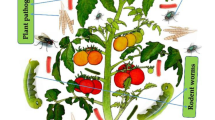Abstract
During tissue culture of black locust (Robinia pseudoacacia L.), serious problems with plant-associated bacteria led to a reduction of propagation potential in several clones. Four dominant strains of plant-associated bacteria could be isolated and were assigned to the genera Acidovorax, Dyella, Microbacterium and Sphingomonas. Out of five essential oils tested, thyme and lemongrass oil at a concentration of 0.03% each and 0.015% of both oils in combination clearly inhibited the growth of these bacteria strains on bacteriologic medium. There were no significant differences in total bacterial population density when penicillin, thyme and lemongrass oil or thyme plus lemongrass oil were added to the plant propagation media. The use of lemongrass oil changed the proportion of dominant bacterial strains.

Similar content being viewed by others
Abbreviations
- cfu:
-
Colony forming units
- TDZ:
-
Thidiazuron
- YMA:
-
Yeast mannitol agar
References
Boine B (2005) Untersuchungen zur Unterdrückung von pflanzenassoziierten Bakterien bei der In-vitro-Vermehrung von Robinie (Robinia pseudoacacia L.). Diploma thesis, Technical University Berlin
Conner DE, Beuchat LR (1984) Sensitivity of heat-stressed yeasts to essential oils of plants. Appl Environ Mikrobiol 47:229–233
Dodd H, Taji A, Hayward C, Dodd B (1992) An unrecognised problem in plant tissue culture. Aust Hortic 90(12):46–50
Ewald D (2007) Transgene Pappeln: Horizontaler Gentransfer von Agrobakterien auf endophytische Bakterien möglich? http://www.biosicherheit.de/de/sicherheitsforschung/167.doku.html. Accessed 28 Jan 2008, http://www.gmo-safety.eu/en/wood/poplar/. Accessed 28 Jan 2008
Hammer KA, Carson CF, Riley TV (1999) Antimicrobial activity of essential oils and other plant extracts. J Appl Microbiol 86:985–990
Kalemba D, Kunicka A (2003) Antibacterial and antifungal properties of essential oils. Curr Med Chem 10:813–829
Murashige T, Skoog F (1962) A revised medium for rapid growth and bioassay with tobacco tissue cultures. Physiol Plant 15:473–497
Naujoks G, Zaspel I, Behrendt U (2000) Micro-organisms acting in tissue culture of black locust (Robinia pseudoacacia L.). In: Cassells AC, Doyle BM, Curry RF (eds) Proceedings of the international symposium on methods and markers for quality assurance in micropropagation. Acta Hortic No 530:129–135
Ulrich K, Stauber T, Ewald D (2008) Paenibacillus—a predominant endophytic bacterium colonising tissue cultures of woody plants. Plant Cell Tiss Organ Cult 93:online first
Acknowledgments
For skilful technical assistance, Mrs Roswitha Rüdiger and Mrs Heidrun Mattauch are gratefully acknowledged.
Author information
Authors and Affiliations
Corresponding author
Rights and permissions
About this article
Cite this article
Boine, B., Naujoks, G. & Stauber, T. Investigations on influencing plant-associated bacteria in tissue cultures of black locust (Robinia pseudoacacia L.). Plant Cell Tiss Organ Cult 94, 219–223 (2008). https://doi.org/10.1007/s11240-008-9395-8
Received:
Accepted:
Published:
Issue Date:
DOI: https://doi.org/10.1007/s11240-008-9395-8




